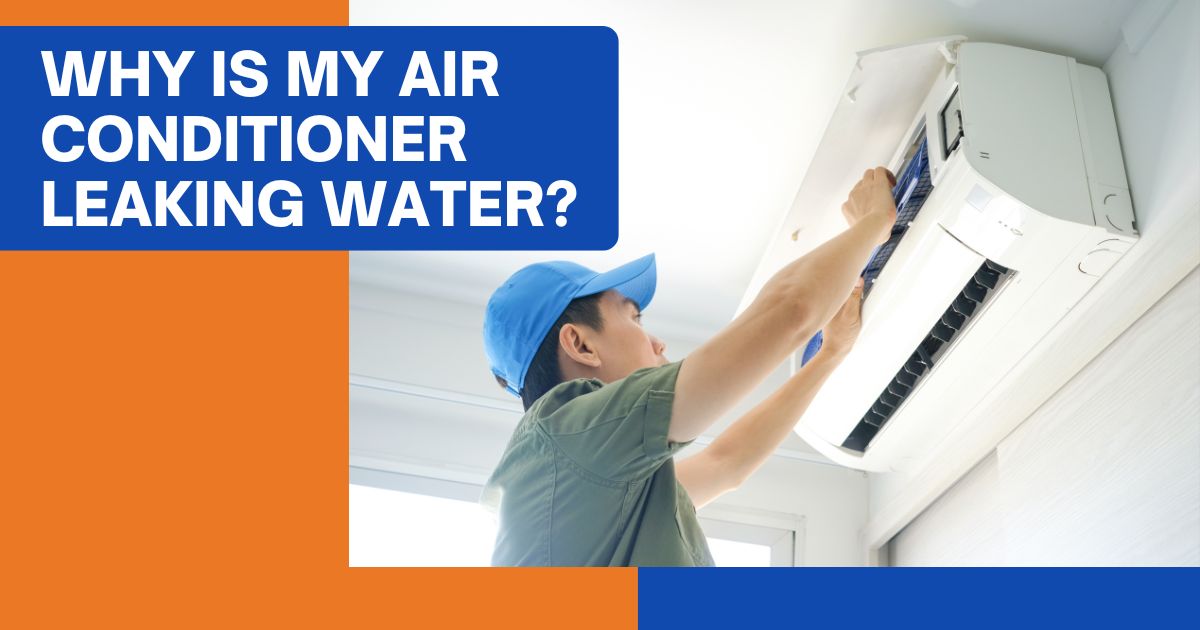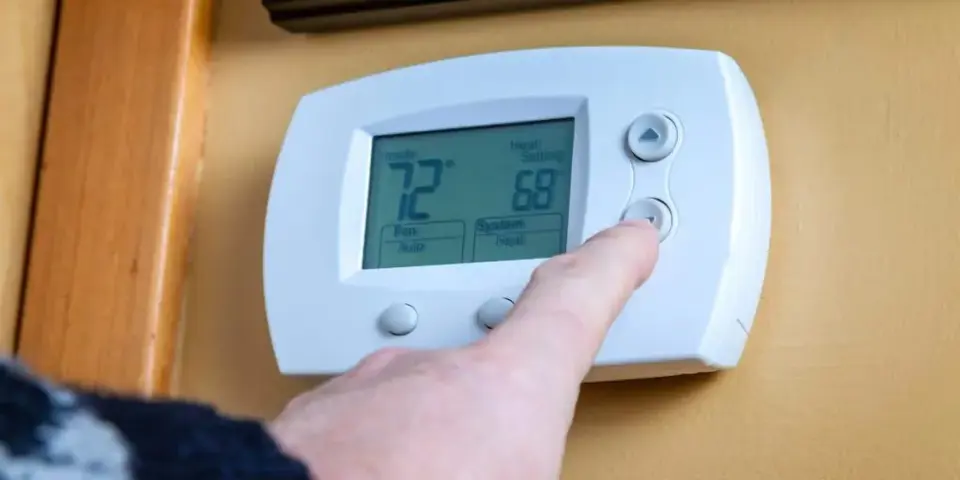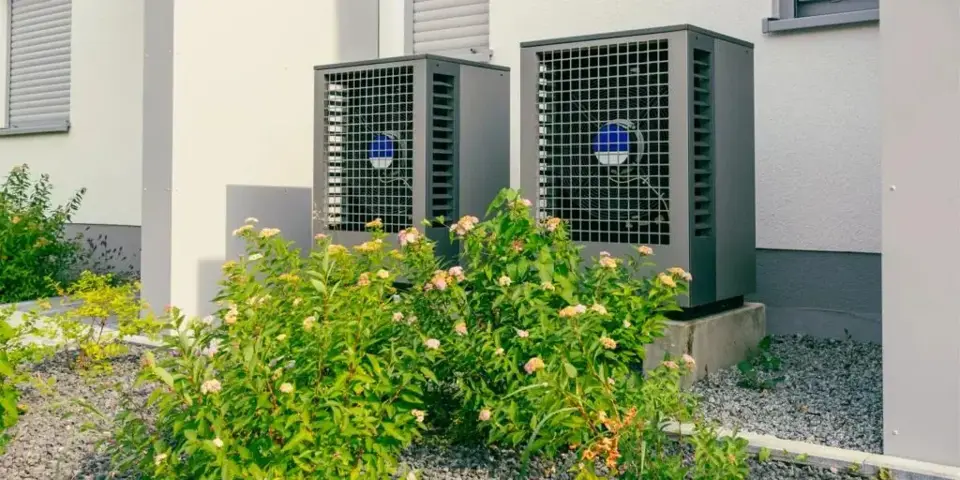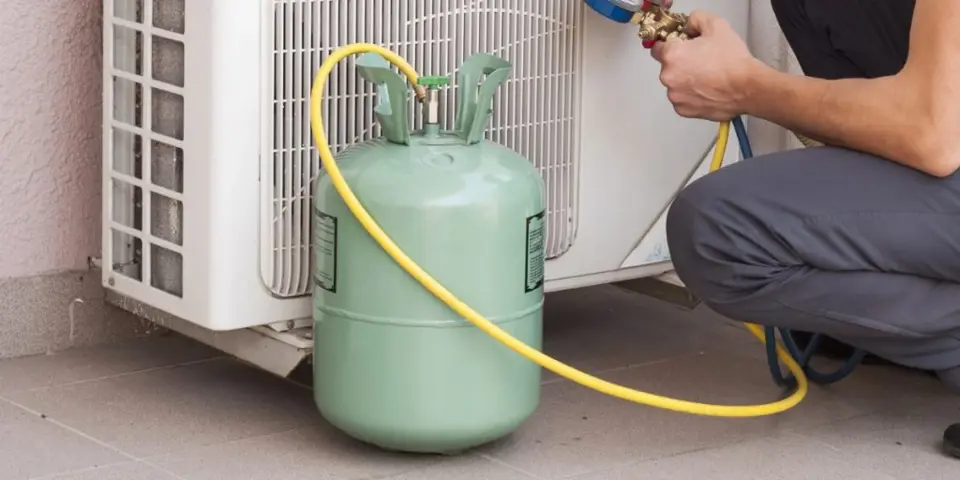An air conditioner leaking water is a common problem that property managers face. If you have noticed water dripping from your AC unit, you may wonder what’s causing this issue and how to resolve it. Engineers design air conditioners to cool and dehumidify the air, but when things go wrong, excess water can cause leaks, which might lead to further damage if left unchecked. In this blog, we’ll explain why your air conditioner may be leaking water and what you can do about it.
Why is My Air Conditioner Leaking Water?
Several factors could lead to an air conditioner leaking water. Below are the most common reasons for an AC to start dripping water or leaking.
Clogged Condensate Drain Line
One of the most common reasons for an air conditioner leaking water is a clogged condensate drain line. The condensate drain line handles carrying the excess water from the evaporator coil away from your system. Over time, the drain line can become blocked by dirt, algae, or other debris, causing water to back up and leak inside your business.
When a clog occurs in the condensate line, the water has nowhere to go, so it can overflow and drip from the air handler. You may notice the water pooling under your unit or dripping down the wall near the AC.
How to fix it: To fix this issue, you can try clearing the clogged drain line with a wet/dry vacuum or using a plumber’s snake. If the clog is severe, you may need to call a professional to clean the drain line for you.
Frozen Evaporator Coil
A frozen evaporator coil is another common cause of an air conditioner leaking water. When the evaporator coil freezes, it prevents the air conditioning system from working properly. As the ice melts, it can cause a significant amount of water to leak from the unit. This usually occurs when something restricts the airflow or when the refrigerant is lacking.
How to fix it: The first step is to turn off your air conditioner to allow the coil to thaw. Once the ice has melted, check for airflow issues, such as dirty air filters or blocked vents. You may also need to have a technician check the refrigerant levels and add more if necessary.
Low refrigerant levels
Low refrigerant levels can lead to the formation of ice on the evaporator coil. If the refrigerant level is too low, the coil can freeze, and when it thaws, it leads to an AC leaking water. The low refrigerant levels could be due to a leak in the system or improper installation.
How to fix it: If you suspect low refrigerant is the issue, call a professional technician to inspect your AC and recharge the refrigerant. It is essential to repair any leaks before adding more refrigerant to the system.
Dirty Air Filters
Dirty or clogged air filters can restrict airflow, causing your air conditioner to work harder. When airflow is restricted, the evaporator coil may freeze, and as it melts, it leads to water leaking from your air conditioner.
How to fix it: Regularly change or clean your air filters to ensure proper airflow. This simple maintenance task can prevent many issues, including AC leaking water.
Faulty or Disconnected Drain Pan
The drain pan collects excess moisture from the evaporator coil. If someone cracks, damages, or improperly positions the drain pan, it can cause water to leak from the air conditioner. In some cases, the drain pan may become disconnected, allowing water to spill out and cause pooling under your AC unit.
How to fix it: Inspect the drain pan for any visible damage or misalignment. If you find any issues, replace or reposition the pan as necessary. If the damage is severe, consult a professional for repair or replacement.
Improper Installation
If your air conditioner is improperly installed, it may cause water to leak. For instance, an unevenly installed unit can lead to improper drainage of the water. Additionally, if the unit is not level, the condensate will not flow into the drain pan, leading to leaks.
To fix it, ensure that you install your air conditioner correctly and level it. If you suspect improper installation, it’s best to consult a professional from R&R Refrigeration & Air Conditioning for a thorough inspection.
Overworked Air Conditioner
Sometimes, high temperatures or an oversized system for the space can cause an air conditioner to become overworked by running continuously. This overworking can cause condensation to build up more than usual, leading to water leaking from the unit.
How to fix it: Ensure that your AC is the right size for your business and not running too long during hot days. Consider upgrading to a more energy-efficient model if needed.
What Can You Do to Prevent AC Leaking Water?
Taking steps to maintain your air conditioner regularly can help prevent leaks. Below are a few maintenance tips:
Sure, here’s the expanded section with additional details:
Change Air Filters Regularly:
Replace your air filters every one to three months to ensure proper airflow and avoid clogging. A dirty air filter can make your air conditioner work harder, increasing energy consumption and leading to possible water leakage due to restricted airflow. Additionally, clean filters help maintain better indoor air quality, so it’s worth the effort.
Clean the Condensate Drain Line:
Regularly inspect and clean the condensate drain line to avoid clogs. If the drain line becomes clogged, water may back up into the system, potentially causing water leaks. Using a wet/dry vacuum to clear the line or a mixture of vinegar and water can prevent the growth of algae and debris inside the line. This simple maintenance step can save you from costly repairs.
Maintain Proper Refrigerant Levels:
Ensure that the refrigerant levels in your AC are correct. If there’s a leak, get it repaired immediately. Low refrigerant can cause the evaporator coil to freeze, leading to water pooling and leaks. It’s important to address refrigerant issues promptly to prevent further damage to your system and avoid more expensive repairs.
Schedule Professional Inspections:
Having a professional technician from R&R Refrigeration & Air Conditioning inspect your unit yearly can help identify and address potential issues before they become major problems. A technician can check the refrigerant, inspect the evaporator coil, and ensure the condensate drain line is functioning properly. Regular inspections are key to keeping your system running smoothly and extending the lifespan of your air conditioner.
Conclusion
If your air conditioner is leaking water, it’s important to act quickly. The causes can vary from a clogged condensate line to frozen coils or low refrigerant. Understanding these issues and taking preventative steps can help keep your AC functioning properly. If you continue to experience problems with your unit, don’t hesitate to contact R&R Refrigeration & Air Conditioning for professional assistance. Keeping your air conditioner in good condition will ensure it runs smoothly all year round.
FAQs
1. Why is my AC leaking water?
Your AC may be leaking water due to clogged condensate drain lines, frozen evaporator coils, or low refrigerant levels. It’s best to inspect the system and address the issue promptly.
2. How can I fix a clogged condensate drain line?
You can use a wet/dry vacuum to clear the drain line or a plumber’s snake for more stubborn clogs. If unsure, call a professional to clean it for you.
3. Can dirty filters cause my air conditioner to leak?
Yes, dirty filters restrict airflow, which can cause the evaporator coil to freeze and eventually leak water when it thaws.
4. How often should I clean my AC’s condensate drain line?
It’s recommended to clean your condensate drain line at least once a year to prevent clogs and water leaks.
5. Can improper installation lead to water leaks in my air conditioner?
Yes, improper installation can cause your AC to leak water. Ensure the unit is level and properly installed to avoid such issues.






